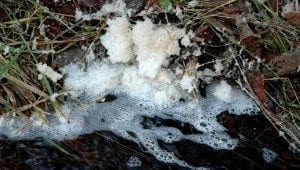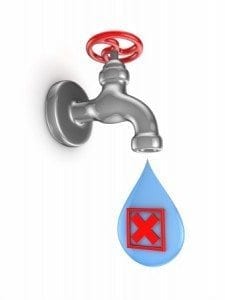Water Contamination. It can happen any time anywhere. The latest example showed up in the news just last week. Over 300,000 residents in Western Virginia were warned not turn on their taps. They were advised not to take showers, brush their teeth, or even do laundry. Why? Because Thursday, Jan. 9 there was a toxic chemical spill into the Elk River in Charleston affecting the water supply in 9 counties.
Elk River in Charleston affecting the water supply in 9 counties.
It was not clear how much of the chemical spilled or in what concentration. The chemical that leaked from containment, 4-methylcyclohexane methanol, is a foaming agent used in the coal preparation process. Potential symptoms of overexposure are irritation of eyes, skin, nose and throat; lightheadedness, drowsiness. Hundreds of thousands of people were drinking the water, using it in baby formula and for their pets etc. just like normal before being alerted to the safety hazard.
Residents of the Charleston area were understandably concerned about the water they consumed prior to having knowledge about the contamination. As one would expect, citizens in the area flocked to local grocery stores and gas stations buying up as much bottled water as they could get their hands on. Shelves were wiped out and residents either had to wait for relief from officials or travel to nearby communities to fill bottles from temporary filling stations.
As the contamination continues downstream, officials in Cincinnati, Ohio are planning to keep their water safe. Cincinnati Water Works has decided to turn off the valves from the Ohio River and instead use water reserves, while they let the chemical pass by.

So to answer the question, if the local authorities said you couldn’t use your tap water, would you be prepared? You would if you were using a Pure & Secure water distiller!
Written by Courtney Meder Lawyer of Pure & Secure, LLC.
References:
http://en.wikipedia.org/wiki/4-Methylcyclohexanemethanol
http://www.cbsnews.com/news/chemical-spill-contaminates-water-supply-in-wva/
http://www.cbsnews.com/videos/w-va-declares-water-safe-for-some-residents-still-skeptical/



This types of articles are very much need to alert people to the hazards which awaits anyone of us, and at anytime.
I live on a polluted well system, whereby, I must process the water before use, and the Pure Water Brand (counter top) distiller provides me pure water from that source; after activated carbon filtration (whole house), and softening; I have no maintenance other than wipe it off;
Please let us not forget that water is the catalyst of all life, including fishes and animals of which we are dependent.
Being prepared with a water production equipment is recommended by this writer!
great article. be prepared boy scout motto. what would you do if the electricity went out? we crank up our distiller once a month and have up to 70 gallons on hand in stainless steel, glass and plastic containers. we also have two E stills. if your going to truly be prepared, you must have redundant systems.
Ray,
I thought I might be too fanatical, but, I read yours, I have only 15 bottles of dithered water prepared for my husband and I, now, I do not feel bad .
: )
Well said. And think of all the benefits and peace of mind that come with using fresh distilled water even BEFORE they discover and announce the hazard! Not a week goes by without more bad water news. A distiller NOW will avoid the worry of when the headline will show up in your town… downstream.